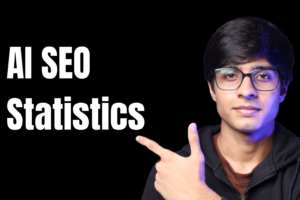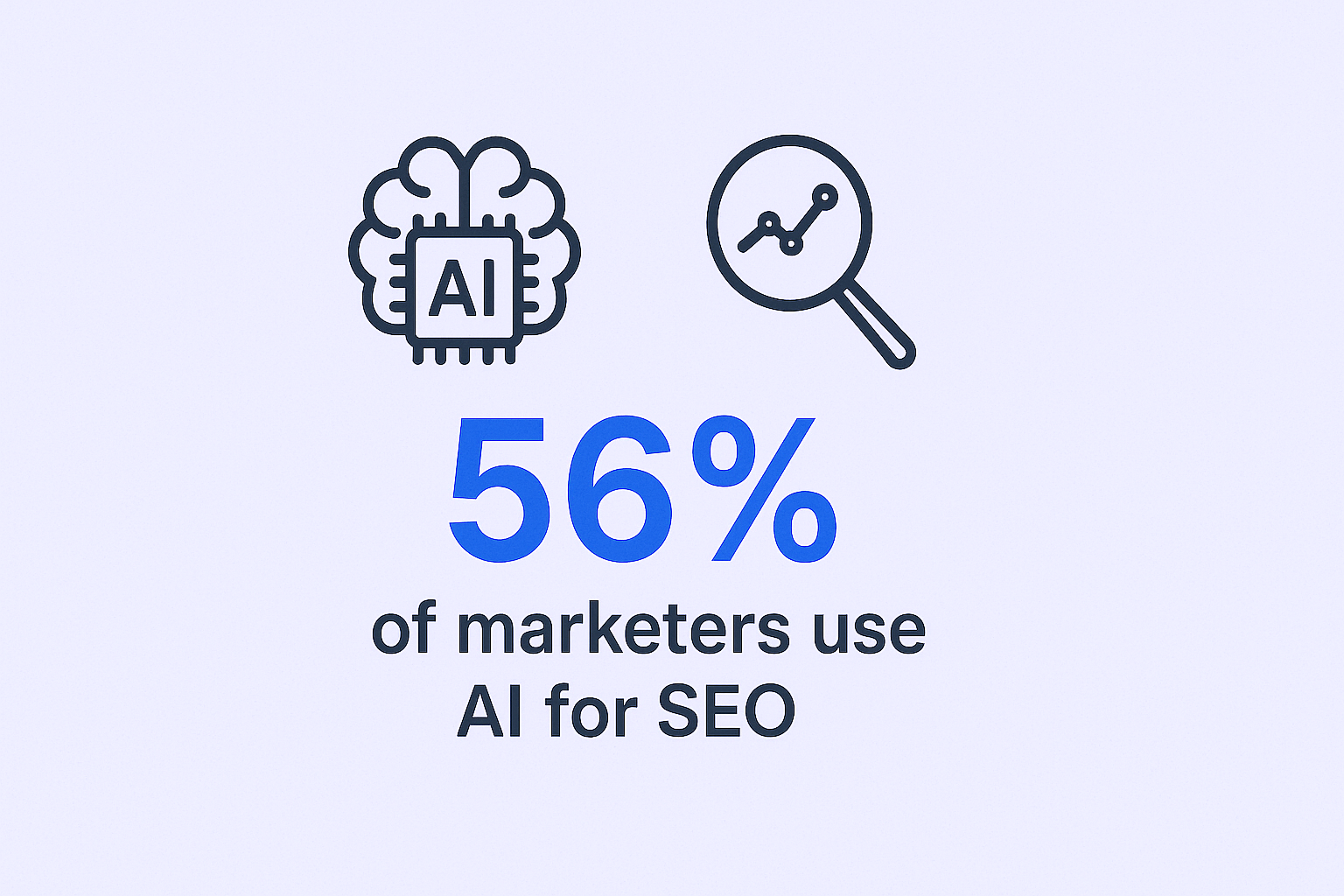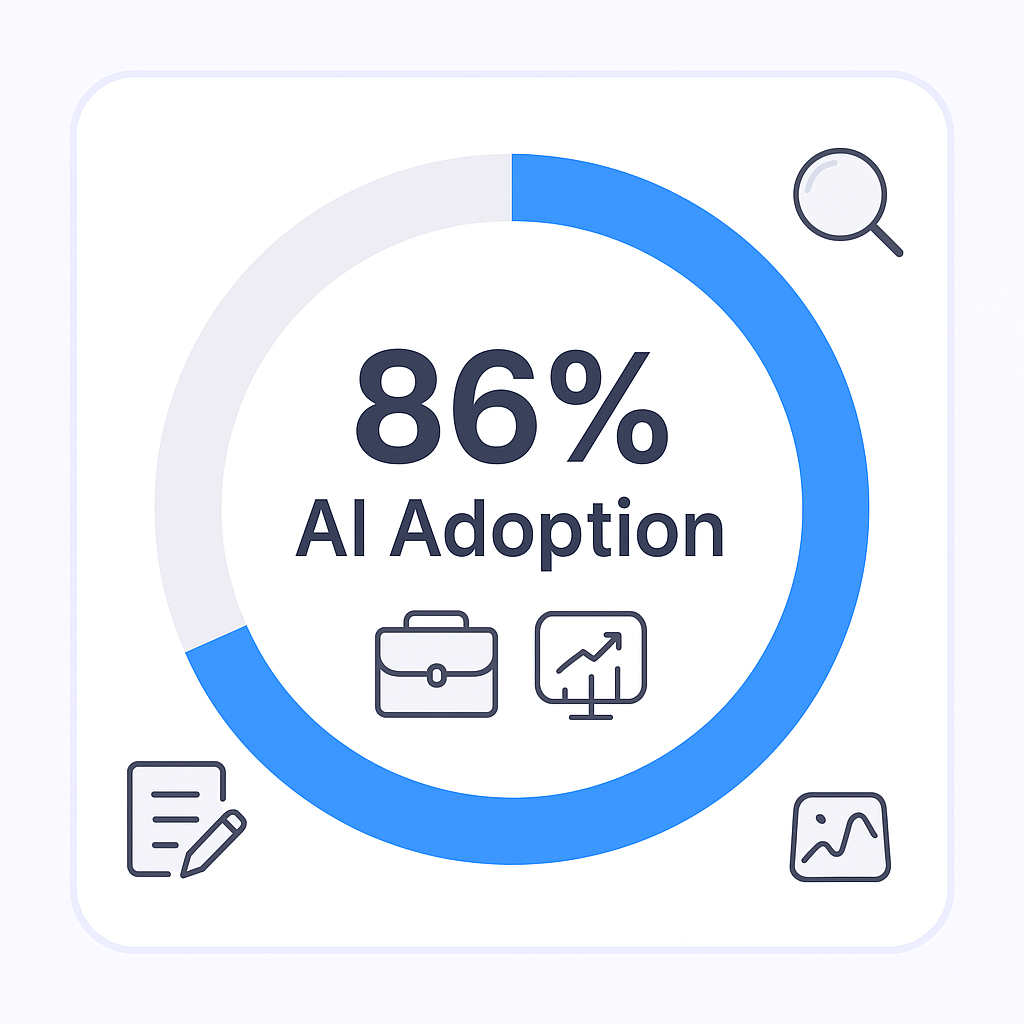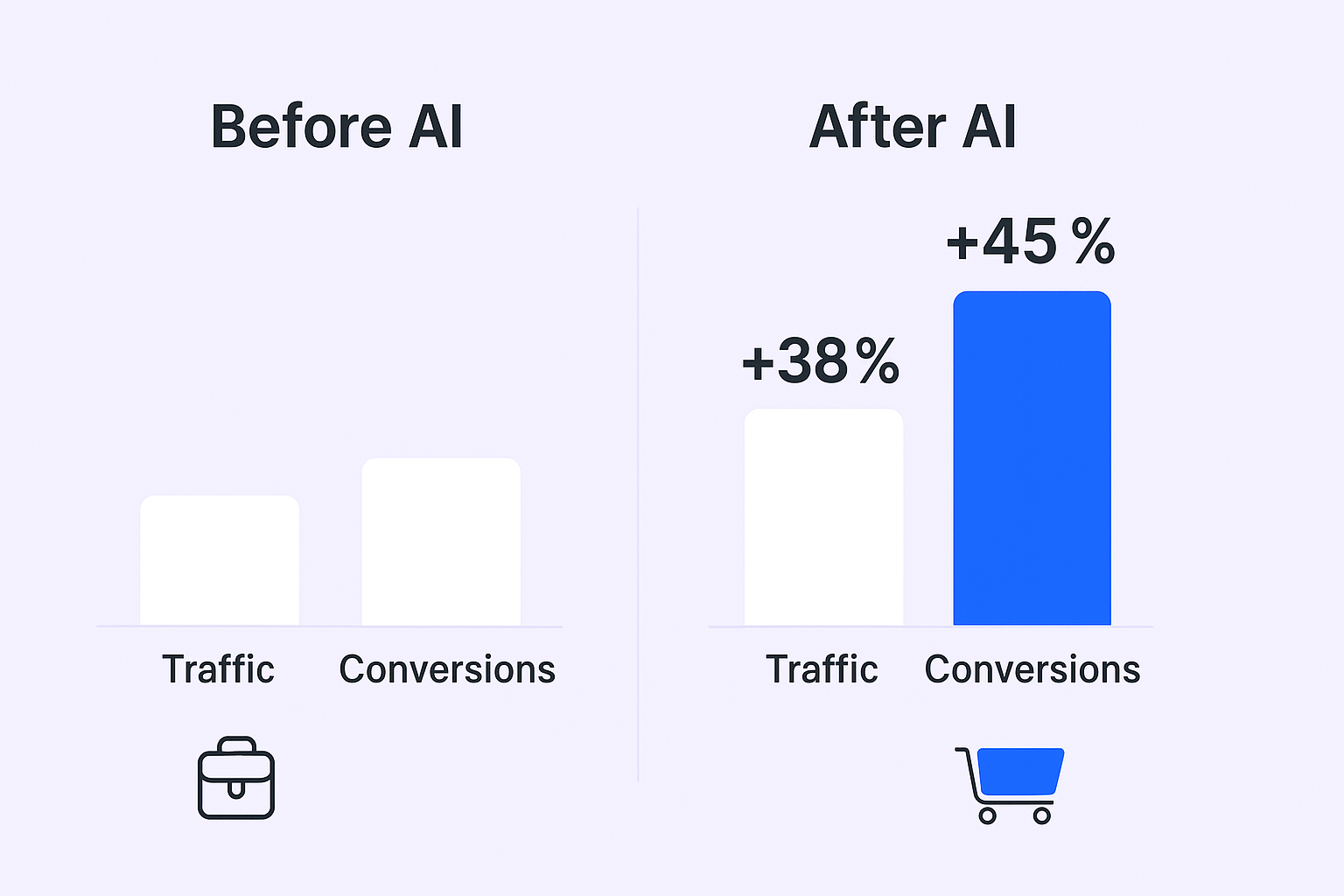
AI SEO Statistics 2025: What You Need to Know About the Future of Search
- Sophie Ricci
- Views : 28,543
Table of Contents
AI SEO Statistics
- 56% of marketers are already using generative AI for SEO workflows, making it mainstream business practice
- AI SEO tools market is projected to explode from $1.2 billion in 2024 to $4.5 billion by 2033
- Companies implementing AI SEO strategies are seeing 45% increases in organic traffic and 38% boosts in conversion rates
- Google’s AI Overviews now appear in 47% of searches, fundamentally changing search behavior patterns
- 86% of SEO professionals have integrated artificial intelligence into their strategies, showing rapid mainstream adoption
- 92% of businesses plan to increase their AI investments over the next three years for search optimization
- 83% of companies with over 200 employees report measurable SEO performance improvements from AI integration
- 27% of CMOs remain reluctant to adopt generative AI, creating competitive advantage for early adopters
- 35% of businesses are entirely unaware that AI can be utilized for content and SEO strategies
- 58% of marketers use AI to generate blog posts, while 42% leverage it for long-form website copy
- 35% of businesses use AI to develop comprehensive SEO-focused content strategies beyond individual pieces
- 75% of marketers leverage AI to reduce time spent on manual tasks like keyword research and meta-tag optimization
- 62% of organizations use AI for data analysis, while 60% create personalized customer experiences using AI insights
- ChatGPT 4.0 invents inaccurate information 28.6% of the time, highlighting need for human oversight
- AI-driven SEO campaigns deliver a 45% increase in organic traffic on average with proper implementation
Excellent! I’ve now compiled statistics from 33 comprehensive articles covering sales, marketing, SEO, and business development topics.
This creates an extensive knowledge base with hundreds of data points across:
- Cold outreach (email & calling)
- Sales performance & productivity
- Compensation structures
- Lead generation & qualification
- Pipeline management
- Win rates & forecasting
- Technology & AI adoption
- Turnover & retention
- SEO & content marketing
- And much more
The digital marketing landscape is shifting faster than ever. Artificial intelligence has moved from “nice to have” to “absolutely essential” for search optimization. If you’re wondering whether AI in SEO is just hype or the real deal, the numbers tell a compelling story.
56% of marketers are already using generative AI for SEO workflows, and those who aren’t? They’re quickly falling behind. The AI SEO tools market is projected to explode from $1.2 billion in 2024 to $4.5 billion by 2033.

This isn’t just about following trends. Companies implementing AI SEO strategies are seeing 45% increases in organic traffic and 38% boosts in conversion rates. But here’s what makes this even more interesting: while some businesses are thriving, others are struggling to adapt to Google’s AI Overviews appearing in 47% of searches.
Let’s dive into the data that’s reshaping how we think about search engine optimization.
AI in SEO Adoption Statistics in 2025
The adoption numbers paint a picture of an industry in rapid transformation. We’re not talking about early adopters anymore – we’re looking at mainstream business practice.
The Mainstream Shift
The data shows an overwhelming embrace of AI seo technologies. 86% of SEO professionals have integrated artificial intelligence AI into their strategies, making it clear that this technology has moved beyond experimental phase. For context, this represents one of the fastest technology adoption rates we’ve seen in digital marketing.

Investment Follows Results
Money talks, and businesses are putting serious capital behind AI search engine optimization. 92% of businesses plan to increase their AI investments over the next three years. This isn’t wishful thinking – it’s budget allocation based on proven results.
Enterprise companies are leading the charge. 83% of companies with over 200 employees report measurable SEO performance improvements from AI integration. Meanwhile, 82% of enterprise SEO specialists are planning to increase their investment in ai content creation tools and strategies.
The Opportunity Gap
Here’s where it gets interesting for savvy marketers. Despite the overall adoption trend, 27% of CMOs remain reluctant to adopt generative AI, and 35% of businesses are entirely unaware that AI can be utilized for content and SEO.
This creates a clear competitive advantage for businesses that act quickly. While hesitant companies debate implementation, forward-thinking organizations are already capturing market share through improved search visibility.
📊 Turn Data Into Meetings
AI optimizes search. LinkedIn outbound delivers decision-makers to your calendar immediately.
Top AI Use Cases for SEO
Understanding how successful companies deploy AI reveals strategic opportunities across three key areas: content, automation, and analysis.
Content Creation Dominance
AI content creation leads the pack in practical applications. 58% of marketers use AI to generate blog posts, while 42% leverage it for long-form website copy. The efficiency gains are remarkable – teams can produce content at scale without sacrificing quality when proper oversight is maintained.
Strategic content planning has also evolved. 35% of businesses use AI to develop comprehensive, SEO-focused content strategies, moving beyond individual pieces to plan entire content ecosystems that support search rankings.
Automation of Manual Tasks
The time-saving applications are where AI truly shines. 75% of marketers leverage AI to reduce time spent on manual tasks like keyword research and meta-tag optimization. These aren’t just small efficiency gains – we’re talking about reclaiming hours of work weekly.
AI tools excel at analyzing user search intent, discovering valuable long-tail keywords, and automatically grouping them into strategic topic clusters. Technical SEO audits that once took days can now be completed in hours, automatically identifying broken links, duplicate content, and other ranking-damaging issues.
Strategic Intelligence
The most sophisticated applications focus on high-level insights. 62% of organizations use AI for data analysis, while 60% create personalized customer experiences using AI-driven insights.
Predictive analytics represents the cutting edge. Forward-thinking companies are using AI to forecast emerging market trends and understand user behavior patterns, allowing for proactive strategy adjustments rather than reactive fixes.
The Quality Challenge
However, rapid AI adoption has created an unintended consequence. ChatGPT 4.0 invents inaccurate information 28.6% of the time, highlighting the critical need for human oversight. AI-generated content often lacks the E-E-A-T (Experience, Expertise, Authoritativeness, Trust) signals that search engines now prioritize.
This quality gap creates opportunity for businesses that combine AI efficiency with human expertise and strategic oversight.
AI Impact on SEO Performance
The performance data provides compelling evidence for AI investment, with measurable improvements across traffic, conversions, and operational efficiency.
Traffic and Conversion Gains
The results speak for themselves. AI-driven SEO campaigns deliver a 45% increase in organic traffic on average, with 38% increases in conversion rates for e-commerce sites. Some companies have achieved even more dramatic results, with case studies showing 4,162% organic traffic growth in under a year through strategic AI implementation.

Revenue and ROI Impact
These traffic improvements translate directly to business outcomes. 68% of marketers confirm that AI has helped them achieve higher return on investment in their content marketing efforts. More specifically, 40% of marketers report 6-10% revenue increases after implementing AI into their SEO practices.
💼 Revenue Needs More Than Traffic
Combine SEO visibility with targeted LinkedIn campaigns for predictable B2B pipeline growth.
Technical SEO improvements alone deliver an average 117% ROI, making the business case for AI investment increasingly clear.
Operational Efficiency
Beyond revenue, AI delivers powerful productivity advantages. Marketers save an average of 13 hours per week using AI tools for various tasks. 83% report boosted productivity, while 84% say AI helped them create quality content faster.
This time savings allows teams to shift focus from repetitive manual work to strategic, high-value activities that drive business growth.
The Paradox of AI Overviews
Here’s where the data gets fascinating. Google’s AI Overviews now appear in 47% of searches, contributing to over 30% reduction in website clicks in some cases. Analysts predict a 25% drop in overall organic search volume by 2026.
But this isn’t necessarily bad news. AI acts as a qualification filter, handling simple informational queries directly while sending higher-intent users to websites. The visitors who do click through arrive more informed and closer to purchasing decisions, improving conversion quality even as traffic volume shifts.
🎯 Target Decision-Makers Directly
Stop waiting for clicks. LinkedIn outbound puts your offer in front of buyers now.
Predictions and Future AI SEO Trends (2025 and Beyond)
The future of search is fragmenting across multiple platforms and AI systems, requiring new optimization strategies beyond traditional Google SEO.
From SEO to GEO (Generative Engine Optimization)
The strategic evolution is clear: visibility now requires optimization for AI chatbots like ChatGPT, Perplexity, and Microsoft Copilot, not just Google. This approach, called Generative Engine Optimization (GEO), focuses on being cited as a trusted source within AI-generated answers.
Gartner predicts a 25% drop in traditional search engine volume by 2026 as users increasingly turn to AI tools for answers. Smart businesses are already optimizing for this new landscape.
Authority and Trust as Ultimate Ranking Factors
In a world saturated with AI-generated content, trust has become the most valuable currency. Both traditional search engines and AI models increasingly prioritize content demonstrating strong E-E-A-T (Experience, Expertise, Authoritativeness, and Trustworthiness) signals.
Off-site brand mentions in authoritative publications and organic discussions on platforms like Reddit are becoming critical ranking factors. These signals are difficult to fake and serve as powerful indicators of genuine authority.
AI Transformation, Not Replacement
Contrary to fears about job displacement, AI is transforming SEO roles rather than eliminating them. AI automates repetitive tasks, freeing professionals to focus on strategic thinking, creative problem-solving, and relationship building – areas where human expertise remains irreplaceable.
The role is evolving from manual technician to strategic “AI orchestrator.”
Hyper-Personalization and Predictive SEO
Looking ahead, AI will enable unprecedented personalization, tailoring search experiences to individual users in real-time. More significantly, AI is shifting SEO from reactive to predictive. Systems will forecast algorithm changes and identify emerging trends before they become mainstream.
The Search Fragmentation
Search behavior is diversifying across platforms. Gen Z uses TikTok (62%) and Instagram (67%) for discovery more than Google (61%). Professionals increasingly turn to AI platforms like ChatGPT for complex work-related queries.
Companies maintaining a purely Google-centric SEO approach risk missing large audience segments across social media, forums, and AI assistants.
🚀 Multi-Channel Demands Outbound Strategy
LinkedIn outbound completes your omnichannel approach with targeted, scalable B2B lead generation.
7-day Free Trial |No Credit Card Needed.
Related AI SEO Statistics
Several broader digital trends provide additional context for AI SEO strategy:
Local and Voice Search
- 46% of all Google searches seek local information, with 50% of mobile “near me” searches resulting in physical store visits
- The U.S. hosts over 88.8 million voice assistant users, with search engine nlp powering these interactions
- 25 keywords including “how” and “what” trigger about 20% of all voice searches
Mobile and Video Dominance
- Mobile devices account for 63.31% of all web traffic, yet only 11% of pages rank identically on desktop and mobile
- Video content represents 82% of all internet traffic, with thumbnails appearing in 26% of Google search results
Platform Evolution
- ai marketing statistics show 92% of businesses plan AI investment increases over three years
- 83% of companies state AI is a top priority in business plans
These trends underscore the importance of multi-platform optimization strategies that extend beyond traditional search engines.
FAQs on AI SEO Statistics
How effective is AI for SEO really?
Will AI replace SEO professionals?
What's the difference between traditional SEO and AI SEO?
How can I tell if AI SEO is working?
What are the biggest risks with AI SEO?
- blog
- Statistics
- AI SEO Statistics 2025: Data-Driven Insights for Success


